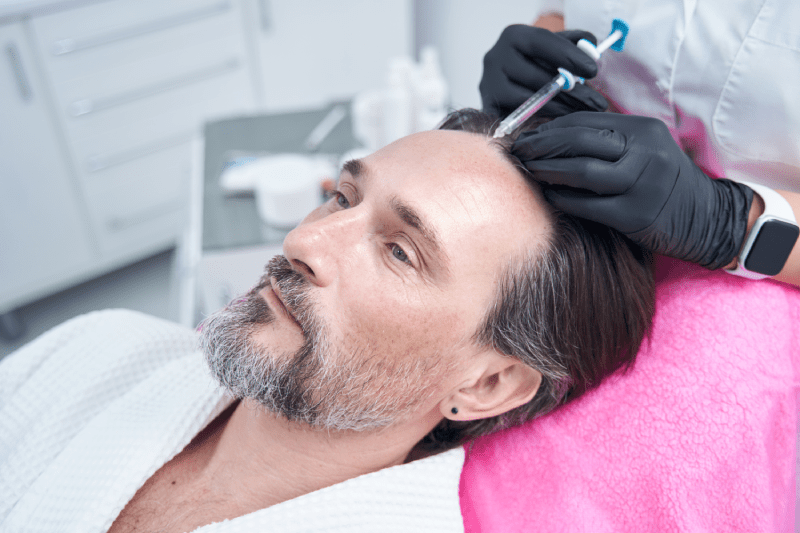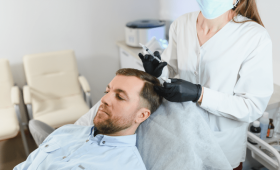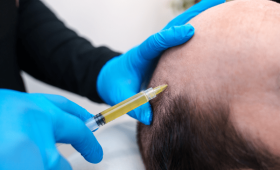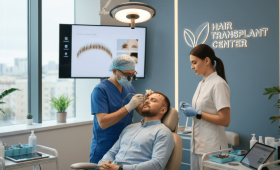The Most Successful Hair Transplant Centers in Turkey
This comprehensive guide analyzes the critical factors that determine the success, quality, and reliability of a clinic for readers considering a hair transplant in Turkey. A successful hair transplant experience relies not only on technical skill but also on strict adherence to detailed patient follow-up, ethical working principles, and international hygiene standards. Turkey is globally recognized as one of the leaders in this field, and choosing the right center is vital for achieving the best results. It must be remembered that the quality of the clinic will directly influence the long-term outcome of the operation.
How Is Hair Transplant Clinic Success Measured In Turkey?
Hair transplant clinic success in Turkey is measured not only by the density of the implanted hairs but also by their naturalness and long-term permanence. A successful outcome requires minimal damage to the donor area, zero or very few complications, and a naturally designed hairline customized to meet the patient’s aesthetic expectations. Furthermore, a high survival rate of the grafts (generally 90% and above) and the meticulous follow-up services offered by the clinic for one year after the surgery are important indicators of success. Centers that prioritize customer satisfaction and maintain transparent communication stand out in the sector for their quality.
What Technologies Are Used By The Most Successful Clinics?
The most successful clinics closely follow current technology and generally use advanced techniques such as Sapphire FUE and DHI (Direct Hair Implantation) in their applications. Sapphire FUE utilizes sharp blades made of special sapphire stone instead of metal tips, allowing for the opening of much smoother and more precise micro-channels. DHI, on the other hand, enables the hair follicles to be placed directly using a special pen (Choi implanter), minimizing the time the roots are exposed to the air. These technologies play a major role in minimizing scarring and ensuring the implanted hairs grow at a more natural angle.
What Accreditations Should Be Sought When Choosing A Clinic?
The most important accreditations to look for when choosing a clinic, in addition to national Ministry of Health approval, are documents demonstrating international quality standards. Particularly, certificates of compliance with high hygiene, patient safety, and quality management standards set by international organizations such as JCI (Joint Commission International) and ISO increase the center’s reliability. These accreditations prove that the clinic’s entire processes (sterilization, patient registration, emergency intervention) are audited and that it provides service at an international level, not just its surgical skill.
Is A High Graft Count The Sole Indicator Of Success?
No, a high graft count is not the sole indicator of success, and it is important to establish realistic expectations for patients in this regard. The real success is the healthy adherence (survival rate) of the implanted grafts and the result of the transplant creating a natural hairline appropriate for the patient’s facial features. If a clinic promises very high graft numbers (e.g., 6000+) despite the patient’s donor area being inadequate, this situation can lead to overuse and permanent damage to the donor area. Quality takes precedence over quantity, and achieving the correct density is the most crucial goal.
How Important Is Team Experience In Successful Clinics?
In a successful hair transplant, team experience and expertise are one of the most critical factors. Hair transplantation is a combination of art and science that requires long hours and high concentration. An experienced team minimizes damage to the grafts during the operation, ensures the roots are implanted at the correct angle and direction, and takes fast and effective measures against possible complications. The clinic having competent and experienced specialists not only at the start of the operation but also during crucial stages like graft harvesting and channel opening directly enhances the quality of the outcome.
What Is The Role Of Detailed Pre-Operative Planning?
Detailed pre-operative planning forms the foundation of a successful result and demonstrates the clinic’s quality. This process includes not only hairline design but also the accurate analysis of the donor area’s capacity, the anticipation of the potential future progression of the patient’s hair loss pattern, and harmony with the existing hair in the recipient area. Successful clinics provide a customized, three-dimensional plan based on scientific data at this stage, combining the patient’s expectations with surgical reality and creating a transparent roadmap.

Which Transplantation Techniques Are Used For The Best Results?
The techniques used for the best and most natural results vary according to the patient’s needs, but they are generally Sapphire FUE or DHI techniques. Sapphire FUE, thanks to its sharp sapphire tips, opens smaller and faster-healing channels, reducing scarring and allowing for denser implantation. DHI, especially in sensitive areas like unshaven transplantation or the front hairline, minimizes the waiting time of the roots, increasing the survival rate and providing higher density. A successful clinic recommends the most suitable technique for the patient’s condition, rather than adhering to a single method.
What Is The Relationship Between Hair Transplant Price And Quality?
There is a directly proportional relationship between hair transplant price and quality; very low prices often indicate low-quality service, inexperienced personnel, and unhygienic conditions. Successful clinics naturally demand higher costs due to their investment in cutting-edge technology equipment (Sapphire tips, cold chain preservation solutions), international accreditations, and high salaries for experienced teams. However, this cost should be viewed as a guarantee for achieving a successful and natural long-term result, minimizing the risk of complications, and avoiding future regrets.
What Are The Warranty Conditions Offered By A Successful Clinic?
The warranty conditions offered by a successful and ethical clinic should be transparent and provided in writing. This warranty typically includes terms such as a free correction session or a refund if a certain percentage of the implanted grafts (e.g., 90%) does not grow healthily within one year. For the warranty coverage to be valid, the patient is expected to strictly follow post-operative care instructions. The extent of the clinic’s confidence in this warranty and the detail of the terms are important ways to assess the center’s quality.
How Do Medical Standards And Hygiene Affect Success?
Medical standards and hygiene are directly impacting and vital factors for hair transplant success and patient safety. In successful clinics, operations are performed in fully-equipped hospitals or sterilized clinic environments with JCI standards. Strict rules, such as the use of single-use surgical materials, the surgical team wearing sterile clothing, and the regular disinfection of instruments, reduce the risk of infection to almost zero. High hygiene not only ensures safety but also maximizes the survival rate of the grafts by keeping them in a healthy environment.
What Is The Level Of International Patient Experience In Clinics?
The international patient experience in Turkey’s most successful clinics is at a very high level, and a special infrastructure has usually been established for this service. This infrastructure includes the availability of multilingual interpreters (English, German, French, Arabic, etc.) and patient coordinators, the organization of VIP transfers from the airport, and the provision of all-inclusive packages that cover accommodation. Meeting all the logistical and communication needs of patients coming from abroad helps to increase overall satisfaction by allowing them to focus solely on their recovery process.
What Is The Importance Of Post-Hair Transplant Follow-Up Services?
Post-hair transplant follow-up services are of critical importance for preserving the success of the procedure in the long term. Successful clinics do not just conclude the operation; they closely monitor the patients’ healing process and hair growth for a full year. This follow-up may include online photo tracking, video consultations, and periodic blood tests. The rapid detection and intervention for early-stage issues (such as infection, temporary shedding due to poor nutrition) ensure the quality of the result and the patient’s psychological comfort.
How Is Hairline Design Done In Successful Clinics?
Hairline design in successful clinics is the most artistic and personalized stage of the operation. The design is done with millimeter precision according to the patient’s face shape, age, the structure of the forehead muscles, and the degree of current hair loss. A successful design should never be a straight line, but must include natural irregularities and transition zones. The specialist at the clinic prepares this design collaboratively with the patient, taking expectations into account, which ensures the result looks completely natural and far from artificial appearance.
Is Donor Area Damage An Indicator Of Failure?
Yes, donor area damage is an important indicator that the clinic or team applied an unsuccessful graft harvesting technique. Permanent thinning, scarring, or a “moth-eaten” appearance can occur if too many grafts are harvested from the donor area, if roots are taken at the wrong angle, or if harvesting is done by an inexperienced team. Successful clinics aim to take the highest quality roots from a limited and safe area, planning not to exceed 20-25% of the total roots to preserve the future appearance of the donor area.
How Reliable Are A Clinic’s Online Reviews?
A clinic’s online reviews provide an important insight into the general patient experience, but they are not a definite indicator of absolute reliability on their own. To make a successful assessment, one should look not only at the star rating but also at the content of the reviews, how detailed they are, and the quality of the clinic’s responses to negative comments. Ethical and successful centers maintain their transparency by providing constructive and solution-oriented answers even to negative feedback. Reviews containing photos and long-term follow-up results are considered more trustworthy.
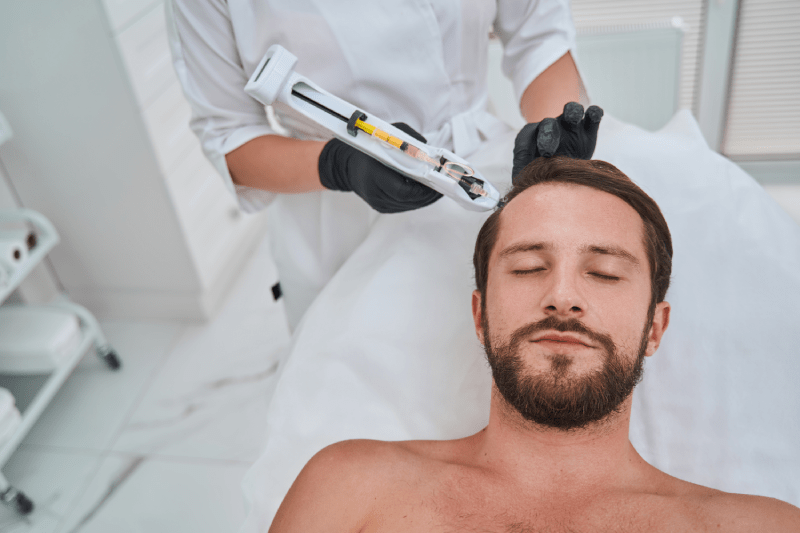
How Many Sessions May Be Required For Successful Results?
How many sessions are required for successful results depends entirely on the patient’s degree of hair loss and the capacity of the donor area. Generally, for patients with advanced hair loss like Norwood 6 and above, or those requesting very high density, a second “densification” session may be necessary 8 to 12 months after the initial operation. A successful clinic clearly communicates a realistic number of sessions and the ideal waiting period between them during the first examination, avoiding unnecessary sessions.
Why Can Successful Clinics Offer Much Better Price Quotes?
The main reason why successful clinics in Turkey can offer better price quotes compared to their international competitors is the exchange rate advantage and high patient volume. Turkey’s local operational costs and living expenses are lower than in Western countries, which reduces the clinic’s overall costs. Furthermore, successful clinics hosting a large number of patients throughout the year reduce their unit costs, allowing them to offer quality services at more competitive prices. This situation is key to providing an economical treatment without compromising on quality.
What Is The Importance Of Pre-Operative Psychological Evaluation?
Pre-operative psychological evaluation is very important to ensure the patient has realistic expectations and is psychologically ready for the changes brought by hair transplantation. This evaluation shows that the clinic values the patient’s mental health as much as their physical health. Early detection of psychological conditions such as body dysmorphic disorder (dismorphophobia) protects the patient from an unnecessary operation and plays an important role in managing expectations.
Who Participates In A Hair Transplant At A Successful Clinic?
A hair transplant operation in a successful clinic is not performed by a single person but by a specialized team. This team typically includes a specialist responsible for the surgical procedure, technicians specialized in graft harvesting and channel opening stages, and nurses responsible for sterilization and patient monitoring throughout the operation. Since graft harvesting and channel opening are the most critical stages, the individuals undertaking these tasks are expected to have years of experience and prioritize patient safety at all times.
What Is The Role Of Solutions Used In The Hair Transplant Procedure?
The solutions used in the hair transplant procedure are vital, directly affecting the survival rate of the grafts. Harvested hair follicles are kept in a specially prepared and generally hypothermic solution (e.g., HypoThermosol) while waiting outside the body. This solution keeps the roots cold, slowing down their metabolism and preventing damage that could result from lack of oxygen and nutrients. Successful clinics take care to use such specialized and high-quality solutions to ensure the highest graft survival rate.
How Is Donor Area Analysis Performed For A Successful Transplant?
Donor area analysis for a successful transplant is performed in an extremely detailed manner using microscopic or digital analysis devices. This analysis determines the density and thickness of the hair roots in the donor area and the number of hair strands in each follicular unit (graft). The data obtained are key parameters that show how many grafts the clinic can harvest and how much density can be achieved without causing permanent damage to the donor area. This meticulous analysis is the first step in creating a personalized and realistic treatment plan.
How Is Pain Control Ensured During Hair Transplantation?
Pain control during hair transplantation is of great importance for the patient’s comfort and relaxation, and successful clinics use advanced techniques in this regard. Local anesthesia can be applied using special needle-free or pressure injection devices before the procedure, minimizing the initial sting. Once the anesthesia is fully effective, the patient does not feel any pain or discomfort during the operation. Some clinics also offer sedation as an option to make the patient more comfortable and relaxed during the process.
How Should The Reference Results Of A Successful Clinic Be Examined?
When examining the reference results of a successful clinic, focus should not only be on photos taken immediately after the operation but on photos showing at least 10-12 months of results. Attention should be paid to ensure the photos are taken under different lighting and angles, and whether the hairline design is appropriate for the patient’s age and facial structure should be evaluated. Furthermore, whether the examined samples include patients with various levels of hair loss is important for understanding the clinic’s general experience.
What Are The Clinic Services For Patients Coming From Abroad?
Clinic services for patients coming from abroad are expanded to cover not only the medical procedure but also all travel and accommodation logistics. These services include VIP vehicle pickup and transfer at the airport, accommodation in luxury hotels, interpreter support during and after the operation, and a detailed care kit containing all medications and care products. Successful centers aim to ensure patients feel safe and comfortable as if they were in their own country.
Why Are Successful Clinics Generally Located In Big Cities?
The main reason successful clinics are generally located in big cities (Istanbul, Izmir, Ankara) is that these cities have advanced medical infrastructure, a pool of specialized personnel, and international accessibility. Big cities facilitate access to the latest medical technology equipment, and due to the high volume of health tourism, a healthy competitive environment is created among clinics. This competition is an important factor that ensures the continuous increase in service quality and keeps prices more competitive.
Does The Age Factor Affect The Success Of Hair Transplantation?
While the age factor is not a direct limitation on the success of hair transplantation, it has a significant impact in terms of correct planning. Hairline design can be difficult in very young patients (under 20) because the hair loss pattern may not have been completed. In advanced ages, the quality and density of the hair roots in the donor area may decrease. A successful clinic plans by anticipating future hair loss in young patients and aims to use existing roots most efficiently in older patients.
Do Successful Clinics Offer An Unshaven Transplant Option?
Yes, successful clinics generally offer special transplant options like unshaven (Unshaven FUE) or partial shaving to address patients’ aesthetic and social concerns. Unshaven transplantation is ideal for women or men who do not want to use short hair, but it usually comes at a higher price because it requires more time, labor, and expertise. A clinic’s ability to offer these options is a sign that its technological equipment and team expertise are advanced.
How Long Does The Operation Take In A Successful Clinic?
The operation time in a successful clinic, depending on the number of grafts to be implanted and the technique used, usually lasts between 6 to 9 hours. This period includes the meticulous steps of graft harvesting, channel opening, and root placement, which should not be rushed. Quality centers manage the operation efficiently to minimize the time the roots spend outside the body, but they never prioritize speed over graft survival rate and naturalness.
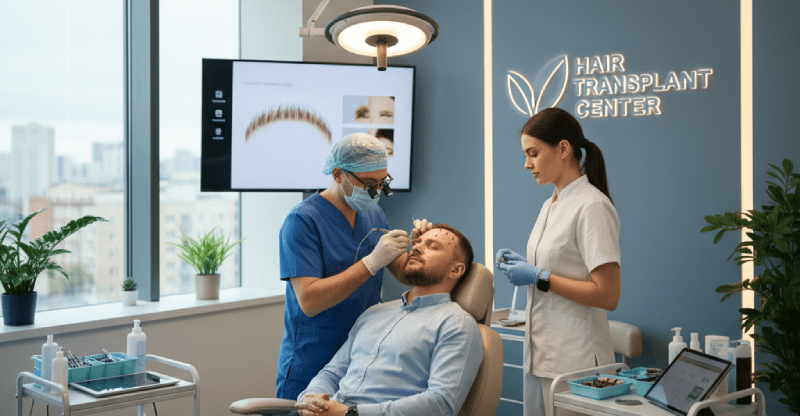
How Is The Recovery Process Accelerated In A Quality Clinic?
The recovery process in a quality clinic is accelerated not only by the post-operative care products provided but also by additional support such as PRP (Platelet-Rich Plasma) or stem cell therapy. These treatments speed up blood circulation and tissue repair in the implanted and donor areas. Furthermore, the correct and gentle performance of the first wash procedure offered by the clinic is vital for the patient to pass the first 10-day crust shedding process comfortably and quickly.
How Is Complication Management After Hair Transplantation Handled?
Complication management after hair transplantation in successful clinics is fast, transparent, and proactive. In rare cases of complications such as infection, severe swelling, or bleeding, the patient is guaranteed 24-hour accessibility and immediate intervention. Detailed blood tests are performed before the operation, and the highest level of hygiene is maintained during the operation to prevent complications. The ability to manage complications is the most important indicator of a clinic’s medical competence.
What Are The Newly Developed Techniques Used By Successful Clinics?
Successful clinics use newly developed techniques besides FUE and DHI that aim to increase patient comfort and result quality. Examples include applications that reduce bleeding and pain with cold laser technology that cools the area to be implanted. Furthermore, the enrichment of special hypothermic solutions to prolong the vitality of the grafts or mega-dose PRP applications used to accelerate healing are among the innovations that successful clinics make a difference with.
How Do Successful Clinics Make A Difference In Revision Hair Transplantation?
Revision hair transplantation is the area that requires the highest level of expertise because it aims to correct problems caused by an unsuccessful operation (artificial hairline, donor damage, low density). Successful clinics are experts in providing density with new grafts while minimizing the donor area in revision cases, and especially in redesigning the naturalness of the front hairline. These clinics analyze the patient’s past failure and plan not only to correct the current situation but also to anticipate future aesthetic issues.
What Is The Importance Of Proper Nutrition And Supplement Products In Hair Transplant Success?
The role of proper nutrition and supplement products in hair transplant success is very important, as the implanted roots need nourishment. Adequate intake of protein, zinc, biotin, and B vitamins supports the strong and fast growth of hair roots. Successful clinics provide personalized nutrition plans and care kits containing these vitamin/mineral supplements for the post-operative period. This support helps to mitigate the severity of the shock shedding process and ensures the hair grows back permanently in a healthier way.
What Are The Health Tourism Legal Permissions Of A Successful Clinic?
For a successful clinic to operate legally in Turkey, it must first have the Medical Tourism Authorization Certificate given by the Ministry of Health. This document shows the clinic’s authorization to accept international patients. Furthermore, the clinic must operate within a hospital or a licensed medical center and must have fulfilled all health insurance and legal obligations. These legal permissions ensure that the patient is protected not only medically but also legally.
What Are The Realistic Expectations For A Successful Hair Transplant?
The most realistic expectations for a successful hair transplant are a natural-looking hairline, the growth of 80-95% of the implanted roots 12-18 months after the operation, and the preservation of the donor area’s appearance. Patients should know that new hair will not grow immediately, shedding (shock loss) will occur, and the final result will be visible after one year. Successful clinics promise the patient a process based on scientific data, requiring patience, not a magical solution.
The decision to undergo a hair transplant in Turkey is a significant investment that will transform your life. Choosing a center that provides the highest standards of service, has a proven track record of success, and prioritizes the patient’s needs is the key to success.
To discover the most suitable, reliable, and highly successful expert team and personalized treatment plan for you, and to confidently start this transformative process, you can contact Cure Holiday.
